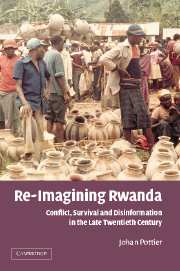Book contents
- Frontmatter
- Contents
- List of maps
- Acknowledgements
- List of abbreviations
- Rwanda
- Great Lakes region
- Rwanda: refugees and displaced populations, 31 March 1995
- Introduction: information and disinformation in times of conflict
- 1 Build-up to war and genocide: society and economy in Rwanda and eastern Zaire
- 2 Mind the gap: how the international press reported on society, politics and history
- 3 For beginners, by beginners: knowledge construction under the Rwandese Patriotic Front
- 4 Labelling refugees: international aid and the discourse of genocide
- 5 Masterclass in surreal diplomacy: understanding the culture of ‘political correctness’
- 6 Land and social development: challenges, proposals and their imagery
- Conclusion: representation and destiny
- Appendix: Summary of key dates and events
- Notes
- Bibliography
- Index
- Titles in the series
Conclusion: representation and destiny
Published online by Cambridge University Press: 22 September 2009
- Frontmatter
- Contents
- List of maps
- Acknowledgements
- List of abbreviations
- Rwanda
- Great Lakes region
- Rwanda: refugees and displaced populations, 31 March 1995
- Introduction: information and disinformation in times of conflict
- 1 Build-up to war and genocide: society and economy in Rwanda and eastern Zaire
- 2 Mind the gap: how the international press reported on society, politics and history
- 3 For beginners, by beginners: knowledge construction under the Rwandese Patriotic Front
- 4 Labelling refugees: international aid and the discourse of genocide
- 5 Masterclass in surreal diplomacy: understanding the culture of ‘political correctness’
- 6 Land and social development: challenges, proposals and their imagery
- Conclusion: representation and destiny
- Appendix: Summary of key dates and events
- Notes
- Bibliography
- Index
- Titles in the series
Summary
Since April 1994, numerous journalists, aid and relief workers, diplomats, politicians and academics have involved themselves with Rwanda and embarked on a mental crusade to make sense of a situation seemingly drained of every form of logic and morality. Searching for instant understandings, the majority of crusaders, particularly from the anglophone world, have come to embrace a model of Rwandan society and history which simplifies complex relations and obscures relevant contexts. The model is rooted in the political doctrine of the Rwandese Patriotic Front, which, as Rwanda's post-genocide spiritual guardian, displays exceptional skill at converting international feelings of guilt and ineptitude into admissions that the Front deserves to have the monopoly on knowledge construction. Once in a while, opinion makers have asked questions about their received wisdom and its source, as when John Ryle exposed the dubious relationship between humanitarian aid and media coverage, but few commentators, if any, have examined in detail the investigative apparatus which produced their perspectives. It seemed better not to examine. Because of the urgency of the situation, which for many meant coping with the refugee crisis or talking diplomacy or reporting to the world, the outsiders could not take time off for a more in-depth study of Rwanda's present and past. They thus found it convenient and practical to accept the new regime's message that post-independence research on Rwanda amounted to ‘fanciful nonsense’ (Fergal Keane), a theme which some newcomer academics elaborated with apologistic zeal.
- Type
- Chapter
- Information
- Re-Imagining RwandaConflict, Survival and Disinformation in the Late Twentieth Century, pp. 202 - 207Publisher: Cambridge University PressPrint publication year: 2002
- 1
- Cited by



